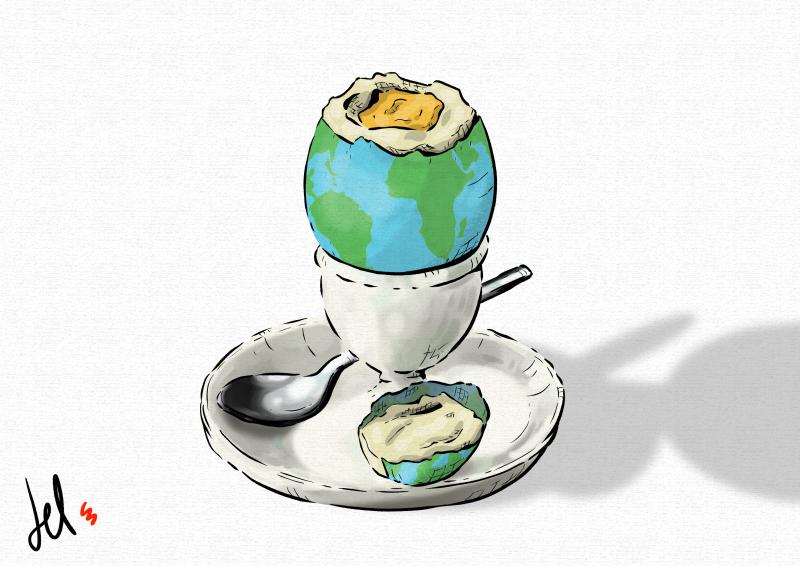The Energy Charter Treaty (ECT) could become a massive threat to efforts by the EU and its member states to achieve their climate targets, according to a new analysis by Investigate Europe. The team of journalists gauged the size of this threat by looking at analyses by NGO Global Energy Monitor and Oil Change International, a research and advocacy organisation. These concerned oil and gas fields, coal-fired power plants, gas-fired plants, liquefied natural gas terminals and gas pipelines.
Signed in 1994 and in legal force since 1998, the treaty is still little known. It currently has 55 signatories and contracting parties, including the EU, and focuses on four different areas: the protection of foreign investments, non-discriminatory conditions for trade in energy materials, the resolution of disputes between investors and host states, and the promotion of energy efficiency.
The fourth area even aims at minimising “the environmental impact of energy production and use”. But this seems ambitious, given that , the treaty is mainly used by European companies and investors to sue member states - or threaten to do so.
In fact, if a government violates the principle of “fair and equitable treatment”, energy investors or companies can sue states before international arbitration courts for billions of euros in compensation - regardless of the fact that it is their opinion against another.In practice lawsuits are usually threatened rather than actually launched.
Interesting article?
It was made possible by Voxeurop’s community. High-quality reporting and translation comes at a cost. To continue producing independent journalism, we need your support.
All in all, across the EU, the UK and Switzerland, fossil infrastructure protected by the ECT is worth €344.6 billion. Three-quarters of it comprises gas and oil fields (€126 billion) and pipelines (€148 billion).
Investigate Europe calls this sum “immense”. It equates to over two years of spending by the European Commission, from agricultural subsidies to all Covid-19 relief packages.
Investors can sue not only for the value of their infrastructure but also for lost expected profits. The actual potential compensation claims could therefore outweigh even the “immense” sum.
In the UK alone the fossil-fuel infrastructure protected by the ECT is worth over €140 billion (it is at least partly owned by foreign investors entitled to sue under the treaty). Potential lawsuits might therefore reach or exceed that amount. Germany follows with €56 billion, then France, Italy, Denmark and the Netherlands (all over €15 billion each).
In more concrete terms, fossil-fuel infrastructure accounts for 5.6% of British GDP. The figure reaches 5.1% in Denmark and 4.7% in Romania and Estonia.
“In the years to come the threat of ECT lawsuits could prevent states from adopting ambitious climate policies – or put plainly: this is already happening,” writes Investigate Europe.
The journalists point out that, “to water down climate laws, companies don’t even have to sue” and “the mere fact that they can sue can be enough to influence climate measures”.
Investigate Europe adds that the ECT administrative staff have “close ties to the fossil fuel industry”. Moreover, arbitration tribunals are described as a “closed club” in a system that allows them practically unlimited fees. For Giacomo Aiello, an Italian state attorney, this “is becoming Russian roulette.[...]There is no obligation to follow case law, no hierarchy of sources. Each case can be different from the next and then a company can always find a favourable judge” somewhere else.
Although Italy left in 2016 and France and Spain had argued for a withdrawal, states can be sued up to 20 years after leaving. Discussions about modernising the treaty have been ongoing since December 2019. Nonetheless, the ECT core budget for 2021 provides nearly €500,000 for expansion and outreach policy.
About this investigation
Investigate Europe is a team of investigative journalists from ten countries that jointly researches topics of European relevance and publishes the results in media outlets across Europe.
In addition to Voxeurop, media partners of this publication include: New Internationalist (UK); Buzzfeed News Deutschland / Frankfurter Rundschau, Ippen.Gruppe (Germany); BastaMag (France) Capital Weekly (Bulgaria); Klassekampen (Norway); Efimerida ton Syntakton (Greece); Público (Portugal); Il Fatto Quotidiano (Italy); Gazeta Wyborcza (Poland); Falter (Austria); Trends (Belgium); Republik (Switzerland); Dagens Nyheter (Sweden); EU Observer.
Further contributed to this research: Wojciech Cieśla, Thodoris Chondrogiannos (Reporters United, Greece), Boryana Dzhamabzova, Ingeborg Eliassen, Juliet Ferguson, Maria Maggiore, Sigrid Melchior, Leïla Miñano, Oliver Moldenhauer, Paulo Pena, Nico Schmidt, Harald Schumann and Elisa Simantke. The project is supported by its readers via donations, and the Schöpflin Foundation, the Rudolf Augstein Foundation, the Fritt Ord Foundation, the Open Society Initiative for Europe, the Gulbenkian Foundation, the Adessium Foundation, and the Reva and David Logan Foundation.













